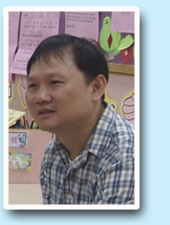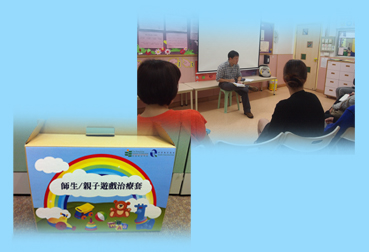 |
 |
| |
Selected Development Project |
| |
 |
| Project Title |
Use of Filial Play Model to Enhance Teacher-Child and Parent-Child Relationships, and Children's Social Competence |
|
| |
| Principal Investigator |
Dr. Leung Chi Hung |
|
| |
| Area of Research Project |
Teacher and Teaching Development |
|
|
|
|
|
| |
| Project Period |
|
|
| Objectives |
-
To provide filial play training to both teachers and parents to enhance teacher–child and parent–child relationships and the social competence of children;
-
To provide training to both teachers and parents on using play assessment (MEACI);
-
To train both teacher and parent participants to be the filial play trainers who can train other teachers and parents in kindergartens; and
-
To disseminate the products of the study, such as DVDs, published manuals, handbooks and exercises, and academic conferences, to the public. The beneficiary groups will be extended to other stakeholders other than the 9 project kindergartens.
|
 |
|
| Methods Used |
|
The project has 2 phases. Each teacher participant will be assigned one of their students, between the ages of 3 and 6, as the ˇ§child of focusˇ¨ for the 10-week training period. Parents of selected child will be the observers in the first phase of training period. In the second phase, the roles of teachers and parents will be swapped.
In Phase 1 (July 2011ˇVJanuary 2012), 28 teachers will be randomly selected to receive the 10-week filial play training in 7 kindergartens. In each kindergarten, 4 selected teachers will be required to give filial play training to 10 children with either internalizing or externalizing problems. The selected teachers will be trained to be the filial play trainer in their kindergartens. Parents with selected child will act as the observer in this phase. They will be asked to observe their childrenˇ¦s performance in the play sessions through the videos taken in each teacher-training session.
In Phase 2 (February 2012–June 2012), 70 parent participants in 10 kindergartens will then be trained to be the filial play parent trainer receiving the 10-week filial play training. Twenty-eight teachers will become the observers in Phase 2. All trainings will also be offered in ten kindergartens after school hours.
|
Summary of Findings |
Due to the small sample size, usually less than 100 cases, data screening is considered to examine the normality of the data, linearity among variables, and homogeneity of variance (Tabachnick & Fidell, 2007).
An analysis of covariance (ANCOVA) is conducted to test the significance of the differences between the experimental and the control groups on the adjusted post-test means for each hypothesis. In each case the post-test specified in each of the hypotheses is used as the dependent variable, and the pre-test as used as the covariant. ANCOVA is used to adjust the group means on the post-test on the basis of the pre-test, thereby statistically equating the control and experimental groups. Significance of difference between means was tested at the .05 level. On the basis of the ANCOVA, the hypotheses are either retained or rejected. Effect size is measured by eta-squared. The appropriateness of the use of covariance is determined by ensuring that no significant correlation exists among the dependent measures (Stevens, 1992; Dancy & Reidy, 2004). The assumption of homogeneity of regression for the ANCOVAs is also checked (Dancy & Reidy, 2004).
|
Impact |
The following strategies are built on the successful experience and good practices of the experimental study done in June 2010. The concept and operation of the 10-week filial play training model is based on Landreth and Brattonˇ¦s ChildˇVparent Relationship Therapy (CPRT) in 2006. The training model has been successfully implemented in enhancing teacherˇVchild relationship and reducing childrenˇ¦s externalization or internalization of problems. The proposed project will extend the training to parents. The proposed project also leads to parentˇVschool cooperation in enhancing childrenˇ¦s social competency.
|
| Selected Publications Related to the Study |
-
Leung, C.H. (2012, In press). Enhancing social competence and child-teacher relationship using child-centred play training model. The Australian Journal of Educational & Developmental Psychology.
-
Leung, C.H. (2011). An experimental study of eduplay and social competency among preschool children In Hong Kong. Early Child Development and Care, 181(4), 535ˇV548.
|
| Biography of Principal Investigator |
Dr. Leung Chi Hung joined the Hong Kong Institute of Education as an Assistant Professor in the Department of Psychological Studies, and is currently an Assistant Professor in the Department of Special Education and Counselling. He is a Chartered Psychologist with a practicising certificate from The British Psychological Society. He has been a member of the APS College of Developmental & Educational Psychologists since 2004. He is currently teaching Research Methods, Human Development, and Children with Special Needs courses. He is now conducting a study of ˇ§Use of Filial Play Model to Enhance TeacherˇVChild and ParentˇVChild Relationships, and childrenˇ¦s social competenceˇ¨ and leading a TDG project of ˇ§Developing and evaluating e-portfolio for the final year project (FYP).ˇ¨ He has taught various psychology subjects for nearly 14 years. His research focuses are (a) play and social competence, (b) Chinese parenting practices, (c) learning effectiveness among university students, and (d) assessing the moral development of pre-school children. |
General Research Fund |
| Quality Education Fund |
|
|
 |
|
 |


